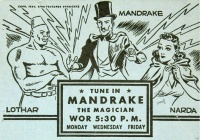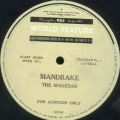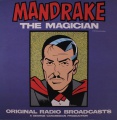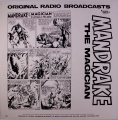Mandrake the Magician (Radio Show)

| |
| Country: | |
|---|---|
"Mandrake the Magician" was a 15 minute serial radio show from late 1940 to early 1942. The sponsor, Taystee Bread Company, had a special membership in the Mandrake Magicians Club.
History
In 1935 King Features Syndicate appointed[1] Fred Smith to head a special radio division to handle all their radio buisness, and by early 1936 he had[1] plans for their comic strips in the radio field: A Comic Page of the Air. The idea was to make a 15-minutes radio program using three comic strips, each four minutes in length. The idea could be adaptet for transcriptions or live broadcast, and for joint or separate sponsorship.
At this time[1] "Flash Gordon" was on the air under the sponsorship of Grove's Nose Drops and "Popeye the Sailor" was on the air under the sponsorship of Wheatena (placed by McKee & Albright, Philadelphia). "Mandrake the Magician" was assigned to Cleveland B. Chase & Co. and the program was in rehersal. KFS also mentioned a few other comic strips ready for radio: "Barney Google", "Beatrice Fairfax", "Blondie", "Bringing Up Father", "Inspector Wade", "Just Kids", "Little Annie Rooney", "Little Jimmy", "Pussy Cat Princess" and "Tilly the Toiler". The scripts was to be written by the licensee and could not follow the same continuity as that being used in the newspapers.
April 1936 King Features KFS had[2] distributed 14 of its newspaper comics strips features to five New York radio production forms to act as selling agents for radio adaptations. The firms had been given six-month contracts to handle the comic strips that was adaptable:
- William Morris Agency to handle "Inspector Wade", "Flash Gordon" "Ace Drummond" and "Blondie";
- Fanchon and Marco to handle "Tillie the Toiler";
- Joseph M. Barnett to handle "Bringing Up Father", "Home Sweet Home" and "The Little King";
- Cleveland B. Chase to handle "Tim Tyler's Luck", "Little Annie Rooney" and "Mandrake the Magician".
There was negoations for "Polly and Her Pals", "Just Kids", Krazy Kat" and "Popeye".
Preparation for the Mandrake the Magician Radio Show
A script was[1] written by Joe Cross (a member of the Chase firm). By 1936[1] the cast for the "Mandrake the Magician" show had been selected and the program was in rehearsal. The production firm reported[1] that it had several agencies interested in the script which would be a quarter-hour program to be broadcast three to five times a week in serial form. A complete 15-minute script was[2] transcripted by World Broadcasting Systems.
It is unknown if this episode ever was aired.
First Time on Air
The "Movie and Radio Guide" list[3] "Mandrake the Magician" aired over WJR (Detroit, Michigan) early 1940 on April 22, 24 and 26. In newspapers from Michigan[footnotes 1] Mandrake the Magician is listed in the radio program overview Mondays and Wednesdays on April 15, 17, 22 and 24. "The Grand Rapids Press" lists Mandrake in the radio program for April 29, but this is probably a mistake as no other newspapers list Mandrake on this day.
This appears to be a test production, but nothing is known about this or which sponsor was involved.
Second Time on Air
In "Broadcasting" there is[4] a small note about testing a thrice-weekly quarter-hour radio version of "Mandrake the Magician" on three stationes: KWK (St. Louis, Missouri), WOR (New York City, New York (Newark, New Jersey)) and WLAC (Memphis, Tennessees). The arrangements with KFS for the sale to Campbell-Ewald Co. (New York) was done by Henry Souvaine, the New York program producer of the radio show. Campbell-Ewald was the agency of the Purity Bakeries (Chicago, Illinois), who owned the Taystee Bread (Nashville and Memphis, Tennessee).
Purity Bakeries Co. launched[5] a large-scale test campaign on Taystee bread that opened on the premiere date of the radio show with newspaper ads, posters and display advertising. The bread itself had a new wrapper that promoted the show. The first broadcast of the radio show was at WOR on Monday November 11 1940, followed by WLAC and KWK on November 18. A similar testing campaign for Taystee Bread began on the day of the premiere also in Nashville and St. Louis.
In November and December, the sponsor placed a number of advertisements for the show in the newspapers in the cities where the show was now airing.
-
ad WOR
-
ad KWK
-
ad WLAC
-
ad KMBC
-
ad KGBX
-
ad KRLD
-
ad KDRO

Two more stationes were added on May 19, 1941: KMBC (Kansas City, Kansas) and KGBX (Springfield, , Missouri). Purity Bakeries said[6] that the program was to be extensively merchandised in the new marked with newspaper ads, truck posters, handbolls, lapel badges, windows streamers and a special "Mandrake the Magician" bread wrapper. Then followed KRLD (Dallas, Texas) on June 9, KDRO (Sedalia, Missouri). And from[7] August 18: KFDM (Beaumont, Texas), KLUF (Galvestone, Texas), KPAC (Port Arthur, Texas) and KPRC (Houston, Texas).
The last radio episode aired by WOR was[8] on February 6, 1942.
About the Radio Show
The show opened with Mandrake invoking his chant, Invoco Legem Magicarum (I invoke the laws of magic) which moved the story forward. 156 episodes were recorded, but only few of them are known today. In the episodes Mandrake fight against evil doers such as; Capt. X, Barracuda, Hithpitch, The Red Baron, Mr. Z and The Green Mask. The plots seems taken from the war theme with bombs, spy rings, submarine attacks near New York City and so on. Some episodes promoted the observance of health rules among children.
Cast & Crew
Writing credits
- Charles Spain Chuck Verral
Director
- Carlo De Angelo
Producer
- Henry Souvaine
Cast
- Raymond Edward Johnson as Mandrake
- Juano Hernandez as Lothar
- Jessica Tandy and Francesca Lenni as Princess Narda
- Others by the Resident equity company
Replays on Air

In transcripted form Mandrake returned[9] on March 23 1942, now aired over the New York City radio station WINS three days a week. To promote the show WINS the week before sent out a mystery bag of tricks, games, and novelties, similar to that received by the some 300,000 boys and girls in the metropolitan area, who was members of the Mandrake Club. The Mandrake show is not mentioned in the Radio programs after June 26 1942, so it was probably taken off the air after this day. It is unknown what sponsor the show had at this time.
On October 12 1942 the New York based WOR was[10] to broadcast the show five days a week at their own station as well over the Mutual radio network starting[11] on October 16. But the station's managment declined[12] to launch the program due to the right situation sorrounding the show.
On October 29 1945 KGO (San Francisco, California) start[13] airing the Mandrake radio show five days a week. Mother's Cake & Cookie Co. (agency Emil Reinhardt, Oakland) was the sponsor for the show. The same date KGER (Long Beach, California) also start broadcasting the show, but it is not known if it also was sponsored by Mother's Cake & Cookie.
KTXL aired the show tre-days-a-week from October 27, 1947, sponsored by Andrew J. Paris (The Bubble King of America). WCRS in Greenwood (South Carolina) aired the radio show in 1947.
Note
- ↑ Radio Programs in: "Battle Creek Enquirer", "Detroit Free Press", "Lansing State Journal", "The Saginaw News"
References
- ↑ 1.0 1.1 1.2 1.3 1.4 1.5 "Newspaper Syndicates Offering Comic Strips and Other Features to Radio."Broadcasting (Washington, D.C.) January 1, 1936, p 8 and 49
- ↑ 2.0 2.1 "King Features Assigns 14 Comic Strips To Sales Firms for Radio Sponsorship." Broadcasting (Washington, D.C.) 15 April 1936, p 62
- ↑ Movie and Radio Guide week of April 20-26, p. 27, 32, 37
- ↑ "Purity Bakeries." Broadcasting (Washington, D.C.) 15 November 1940, p 40
- ↑ "Advertising News and Notes- To Test Ads on Taystee Bread", The New York Times, 8 Nov 1940, p 41
- ↑ "Purity Bakeries Adding Series." Broadcasting (Washington, D.C.) 19 May 1941, p 12
- ↑ "Purity Bakeries Adding: New Programs Is Tested." Broadcasting (Washington, D.C.) 18 August 1941, p 56
- ↑ Movie and Radio Guide, (Triangle Publications, Philadelphia) Week of January 31 - 6 February 1942, p 31
- ↑ "Mandrake's Tricks", Broadcasting, 23 March, 1942, p 44
- ↑ "Over the Air -News-Views-Gossip." Wisconsin Rapid Daily Tribune (Wisconsin) 12 October 1942, p 2
- ↑ "Coast-to-Coast", Radio Daily, 7 October 1942, p. 8
- ↑ "Mandrake the Magician Delayed Revival Due To Rights Complication", Variety, 21 October 1942, p. 32
- ↑ "Sponsors." Broadcasting (Washington, D.C.) 12 November 1945, p 74
Presenting Mandrake the Magician
The show opened with Mandrake invoking his chant, Invoco Legem Magicarum (I invoke the laws of magic) which moved the story forward. At least 195 episodes were recorded, but only few of them are known today. In the episodes Mandrake fight against evil doers such as; Capt. X, Barracuda, Hithpitch, The Red Baron, Mr. Z and The Green Mask. The plots seems taken from the war theme with bombs, spy rings, submarine attacks near New York City and so on. Some episodes promoted the observance of health rules among children.
Cast & Crew
Writing credits
- Charles Spain Chuck Verral
Director
- Carlo De Angelo
Producer
- Henry Souvaine
Cast
- Raymond Edward Johnson as Mandrake
- Juano Hernandez as Lothar
- Jessica Tandy and Francesca Lenni as Princess Narda
- Others by the Resident equity company
Reprints
Vinyl
Mandrake the Magician Original Radio Broadcasts was released by George Garabedian Productions in 1973.
Internet
Radio Echoes has a wide selection of Old Time Radio shows that one can listen to, among them 29 episodes of Mandrake.
working
-
Lee Falk and Carlo de Angelo (November 1940)
-
WOR & Taystee Bread
December 12, 1940 -
WOR & Taystee Bread
October 8, 1941 -
Newspaper review
-
NBC Network ad
-
Brochure For Radio Programs
See also
| Team Ups, Mandrake outside the comic strips, Varia | |
|---|---|
| Team Ups |
Defenders of the Earth • Kings Watch • King: Mandrake the Magician • Kings Quest |
| Adaptations |
1939 Movie Serial • 1940 Radio Show • 1954 TV Pilot • 1967 Killing vs Mandrake • 1979 TV Movie • Unproduced and Unfinished Films • Musical: Mandrake the Magician and the Enchantress • Prose Stories • Defenders of the Earth • Comics on TV • Pop Art |
| Memorabilia | |
| Other |
Easter Eggs and Cameos • Fanzines and Fan Magazines • Reference Books |














